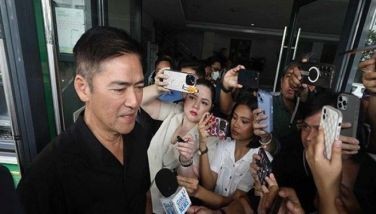DepEd stops delivery of 60,000 defective textbooks
January 23, 2007 | 12:00am
The Department of Education (DepEd) has ordered a stop to the delivery of 60,000 defective textbooks, Secretary Jesli Lapus said yesterday.
Lapus said his department already knew the error even before Sen. Panfilo Lacson called his attention to it.
"The defects were already discovered and we gave instructions that they should not be delivered unless they are already corrected," Lapus said in a text message.
He also downplayed the issue, saying the defective books represent just a small fraction of the total number of textbooks printed.
"The 60,000 copies, found to be defective allegedly, are only one-half of one percent of about 12 million total number of textbooks," Lapus said.
The textbooks’ defects include inverted or wrinkled pages, and incomplete trimmings.
"It was DepEd inspectors at the warehouses who discovered (the errors) in random checking," he said. "System provides for warehouse or pre-delivery random inspections, then total inspection upon delivery in schools, for quantity and quality," Lapus said.
He said reputable civil society organizations usually help in the screening of textbooks that leave the printing presses.
"Any defective deliveries are rejected. Further, contract has a one- year warranty. Everything is transparent and normal," he said.
"We have with us more than 30 civil society organizations who help us in the yearly delivery to determine the quality of the textbooks," Lapus said.
A DepEd memorandum dated Jan. 4, 2007 and issued by Undersecretary Ramon Bacani, informed public school officials of the problem and that the defective books "were rejected or replaced prior to delivery." But Lacson alleged that the textbooks were "due for delivery."
In a related development, Bacani denied that conflicts of interest characterized the textbook bidding process. A DepEd insider who requested anonymity said some publishers are allowed to bid in the same category but with different authors.
But Bacani, who chairs DepEd’s bids and awards committee, said that even if a publisher has developed two different textbooks, he may still be allowed to join the bidding if a copyright or ownership of one book has already been sold to another publisher who is also involved in the bidding.
He said a publisher who thinks he will be unable to meet printing and delivery requirements sells the rights to a textbook to different groups.
"Legally it is allowed. The ownership or copyrights have been sold to different groups already. So there is no conflict of interest," Bacani told The STAR.
Moreover, a bid bulletin dated Dec. 20, 2006 showed the lifting of the prohibition on interlocking of officers and interests for the P1.2- billion textbook purchase this year under a World Bank loan program.
Lapus said his department already knew the error even before Sen. Panfilo Lacson called his attention to it.
"The defects were already discovered and we gave instructions that they should not be delivered unless they are already corrected," Lapus said in a text message.
He also downplayed the issue, saying the defective books represent just a small fraction of the total number of textbooks printed.
"The 60,000 copies, found to be defective allegedly, are only one-half of one percent of about 12 million total number of textbooks," Lapus said.
The textbooks’ defects include inverted or wrinkled pages, and incomplete trimmings.
"It was DepEd inspectors at the warehouses who discovered (the errors) in random checking," he said. "System provides for warehouse or pre-delivery random inspections, then total inspection upon delivery in schools, for quantity and quality," Lapus said.
He said reputable civil society organizations usually help in the screening of textbooks that leave the printing presses.
"Any defective deliveries are rejected. Further, contract has a one- year warranty. Everything is transparent and normal," he said.
"We have with us more than 30 civil society organizations who help us in the yearly delivery to determine the quality of the textbooks," Lapus said.
A DepEd memorandum dated Jan. 4, 2007 and issued by Undersecretary Ramon Bacani, informed public school officials of the problem and that the defective books "were rejected or replaced prior to delivery." But Lacson alleged that the textbooks were "due for delivery."
In a related development, Bacani denied that conflicts of interest characterized the textbook bidding process. A DepEd insider who requested anonymity said some publishers are allowed to bid in the same category but with different authors.
But Bacani, who chairs DepEd’s bids and awards committee, said that even if a publisher has developed two different textbooks, he may still be allowed to join the bidding if a copyright or ownership of one book has already been sold to another publisher who is also involved in the bidding.
He said a publisher who thinks he will be unable to meet printing and delivery requirements sells the rights to a textbook to different groups.
"Legally it is allowed. The ownership or copyrights have been sold to different groups already. So there is no conflict of interest," Bacani told The STAR.
Moreover, a bid bulletin dated Dec. 20, 2006 showed the lifting of the prohibition on interlocking of officers and interests for the P1.2- billion textbook purchase this year under a World Bank loan program.
BrandSpace Articles
<
>
- Latest
- Trending
Trending
Latest
Trending
Latest
Recommended
































